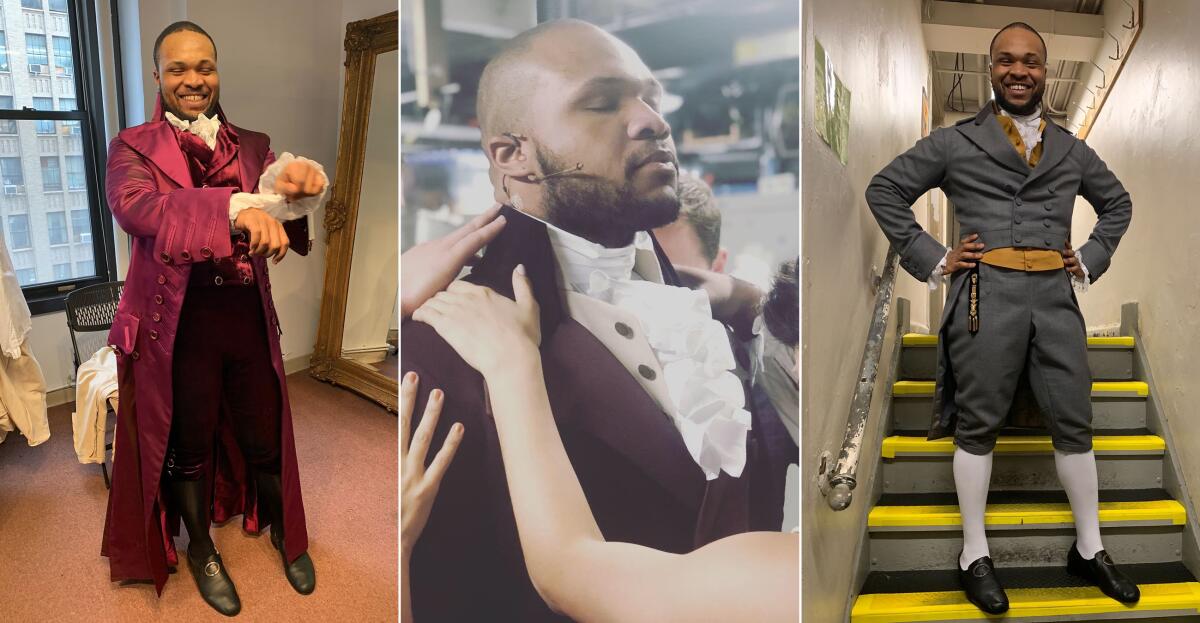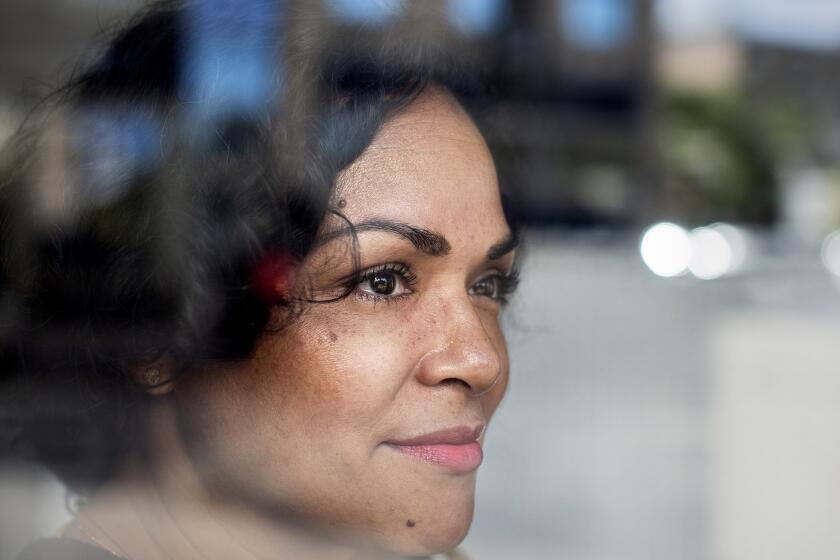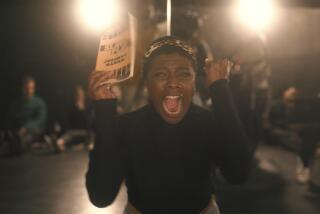A ‘Hamilton’ actor asked for a gender-neutral dressing room, and hasn’t performed since

- Share via
“Hamilton” has been hailed as a showcase of diversity and inclusion, but a complaint filed Wednesday with federal civil rights authorities accuses the hit musical of discrimination and retaliation against a Black transgender cast member.
Suni Reid, who has performed in various “Hamilton” productions since 2017 and was part of the Los Angeles cast before the COVID-19 shutdowns last year, filed a complaint with the Equal Employment Opportunity Commission that said Reid repeatedly was harassed by other cast members, often in the dressing spaces for male performers.
The complaint (which can be read here) also said that after Reid asked for a gender-neutral dressing room to be set up at the Hollywood Pantages Theatre — a request in line with California law requiring employers to provide gender-neutral facilities — Reid’s contract was not renewed and the performer was dropped from the production.
Reid filed the complaint in Los Angeles against the musical’s parent company, as well as the reopened Pantages production (known as the Eliza Tour) and Adventureland LLC, which handles contractual negotiations and other corporate administrative matters for the Eliza Tour.
The Tony nominee gets candid about her painful “Moulin Rouge!” role and her “isolating” exit from commercial theater.
In response to the complaint, a “Hamilton” spokesperson denied the allegations in an email to The Times on Wednesday.
“Suni Reid was a valued cast member for more than three years,” the statement said. “We offered them a contract to return to ‘Hamilton’ with terms responsive to their requests. ... We have not discriminated or retaliated against Suni.”
Like all other live productions, “Hamilton” is ultimately a business, said Reid’s attorney, Lawrence M. Pearson of Wigdor LLP, a firm that has represented victims in discrimination and harassment cases against Harvey Weinstein, Fox News and the Recording Academy. “And all businesses put on a certain amount of performance — as in, a veneer or facade of social consciousness.”
Pearson said companies may take public stands in favor of broad social justice causes or become symbols of diversity in their industry. But “if a business is not willing to engage and follow through on sincere employee concerns about workplace mistreatment, requests for accommodation based upon protected characteristics including gender identity, then it really is a performance to say that your organization is devoted to these causes.”
Reid said they first saw “Hamilton” in 2015, when a friend won a pair of $10 tickets. “I remember feeling thrilled — I was a young, aspiring theater artist, sitting front row to all of this magnificent Black talent on a Broadway stage,” they recalled of watching the original cast. “It was so cool to see myself reflected in that space, and it really lit a fire under me to visualize it for myself and see if I could make it up there too.”
Shortly after graduating from Pace University’s performing arts program in 2017, Reid joined “Hamilton” on Broadway, playing the ensemble role of Man Six and later understudying multiple major roles. Reid then became an offstage standby for the Chicago production, filling in as Aaron Burr, George Washington, Hercules Mulligan/James Madison and Marquis de Lafayette/Thomas Jefferson.

The complaint lists examples of harassment that Reid claims to have experienced from members of “Hamilton” cast and crew, ranging from discriminatory comments regarding gender identity to homophobic altercations — and a lack of action after reporting the misconduct to management.
“It’s a very vulnerable thing to share,” they said of the incidents. “It makes me a little anxious, but at the same time, it’s very unfair that this company gets to enjoy the benefits of these claims of diversity and inclusion, but essentially excommunicate someone who spoke up about it.”
Reid’s complaint said the request for a gender-neutral dressing room would have benefited other cast members who also had expressed interest in using one, but management’s response was to partition a portion of the main dressing area with a sheet or curtain — which Reed’s complaint called insufficient.
Rory O’Malley, who plays King George, offered to give up his private dressing room, and eventually a gender-neutral dressing room was established at the Pantages. But Reid, who was still on the payroll, remained excluded from rehearsals and performances, the complaint said. Last month, Reid was informed that the company no longer wanted Reid to perform in any “Hamilton” production.
After 17 months, our critic heads back indoors for the reopening of “Hamilton” in Hollywood. The experience is not entirely what he expected.
“Since the shutdown, our organization has taken care of our community,” the “Hamilton” spokesperson said in the statement to The Times. “We have treated Suni with the same respect and consideration as all the company members of ‘Hamilton.’ Specifically, we have given Suni direct financial support, paid for their health insurance, and paid for their housing. We wish Suni well in their future endeavors.”
Reid, who is on the board of the nonprofit organization Broadway for Racial Justice, still hopes to rejoin “Hamilton” and, “in an ideal world, find some level of accountability and acknowledgment of harm done from the producers.”
“A lot of theater artists have spoken out about the injustices they’ve experienced inside these theaters and within these companies,” Reid said, referencing the published accounts by “Hamilton” alum Daniel James Belnavis and “Jagged Little Pill” performer Nora Schell.
“It feels as though Broadway and the entire industry has reopened without necessarily acknowledging a lot of these things,” they said. “Those people who are smiling and singing and dancing and bringing them such joy — what is happening to those people after they exit the stage? What are their working conditions? I hope this is an opportunity for consumers of theater to dig deeper and be mindful of where their dollar is going.”
More to Read
The biggest entertainment stories
Get our big stories about Hollywood, film, television, music, arts, culture and more right in your inbox as soon as they publish.
You may occasionally receive promotional content from the Los Angeles Times.












